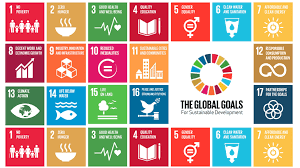The Importance of Sustainability in Achieving the SDGs
Sustainability is a key factor in achieving the Sustainable Development Goals (SDGs) set by the United Nations. The SDGs are a universal call to action to end poverty, protect the planet, and ensure that all people enjoy peace and prosperity by 2030.
At the heart of the SDGs is the concept of sustainability, which recognises that economic development must be balanced with social progress and environmental protection. This holistic approach aims to create a world where future generations can thrive without compromising the needs of present generations.
The Three Pillars of Sustainability
Sustainability is often described in terms of three interconnected pillars: economic, social, and environmental. These pillars represent the fundamental areas that must be addressed to achieve sustainable development.
- Economic sustainability: This pillar focuses on promoting economic growth that is inclusive and sustainable. It aims to ensure that all individuals have access to opportunities for economic advancement while safeguarding resources for future generations.
- Social sustainability: Social sustainability emphasises equity, social cohesion, and inclusivity. It seeks to create societies where all individuals have equal rights and opportunities for development, regardless of their background or circumstances.
- Environmental sustainability: Environmental sustainability aims to protect natural resources and ecosystems for current and future generations. It involves reducing pollution, conserving biodiversity, and mitigating climate change through sustainable practices.
The Role of Sustainability in Achieving the SDGs
Sustainability is integral to achieving the SDGs because it provides a framework for balancing economic growth with social progress and environmental protection. By adopting sustainable practices, countries can address pressing global challenges such as poverty, inequality, climate change, and environmental degradation.
Furthermore, sustainability ensures that development efforts are long-lasting and beneficial to all members of society. By considering the needs of present and future generations, countries can create a more resilient and prosperous world for all.
In Conclusion
Sustainability plays a crucial role in achieving the SDGs by providing a comprehensive framework for addressing global challenges in a balanced manner. By promoting economic, social, and environmental sustainability, countries can work towards a more equitable, prosperous, and sustainable future for all.
Frequently Asked Questions About Sustainability and the Sustainable Development Goals (SDGs)
- What does SDG mean in sustainability?
- What is an SDG in sustainability?
- What are the 6 major goals of sustainability?
- What are the 17 Sustainable Development Goals?
- What are the 5 goals of sustainable development?
What does SDG mean in sustainability?
The term SDG stands for Sustainable Development Goals in the context of sustainability. The SDGs are a set of 17 global goals established by the United Nations to address various social, economic, and environmental challenges facing the world today. These goals provide a framework for countries and organisations to work towards a more sustainable future by promoting actions that balance economic growth, social inclusion, and environmental protection. Achieving the SDGs is crucial for ensuring a prosperous and equitable world for present and future generations.
What is an SDG in sustainability?
An SDG, or Sustainable Development Goal, in the context of sustainability, refers to a set of global objectives established by the United Nations to address pressing social, economic, and environmental challenges facing the world today. These goals aim to promote sustainable development by balancing economic growth with social progress and environmental protection. The SDGs provide a roadmap for countries to work towards a more equitable and sustainable future by addressing issues such as poverty, inequality, climate change, and biodiversity loss. Each SDG outlines specific targets and indicators that help track progress towards achieving a more sustainable world for present and future generations.
What are the 6 major goals of sustainability?
One frequently asked question regarding sustainability and the Sustainable Development Goals (SDGs) is, “What are the 6 major goals of sustainability?” Sustainability encompasses a wide range of objectives aimed at achieving a balance between economic growth, social progress, and environmental protection. The six major goals of sustainability typically include promoting economic prosperity, fostering social equity and inclusivity, conserving natural resources and biodiversity, mitigating climate change, reducing pollution and waste, and ensuring sustainable consumption and production patterns. These interconnected goals form the foundation for sustainable development efforts worldwide, guiding actions towards a more resilient and harmonious future for both people and the planet.
What are the 17 Sustainable Development Goals?
The 17 Sustainable Development Goals (SDGs) are a set of global objectives established by the United Nations to address pressing challenges and promote sustainable development worldwide. These goals cover a wide range of interconnected issues, including poverty eradication, quality education, gender equality, clean water and sanitation, affordable and clean energy, sustainable cities and communities, climate action, and life below water and on land. Each goal is designed to be ambitious yet achievable by 2030, with the aim of creating a more equitable, resilient, and sustainable future for all.
What are the 5 goals of sustainable development?
One frequently asked question regarding sustainability and the Sustainable Development Goals (SDGs) is, “What are the 5 goals of sustainable development?” The answer to this question lies in understanding that the SDGs encompass a comprehensive set of 17 interconnected goals established by the United Nations to address global challenges and achieve a more sustainable future by 2030. These goals cover a wide range of areas, including ending poverty, ensuring access to quality education and healthcare, promoting gender equality, fostering sustainable economic growth, and combating climate change. Each goal plays a crucial role in advancing sustainable development and creating a more equitable and prosperous world for all.
